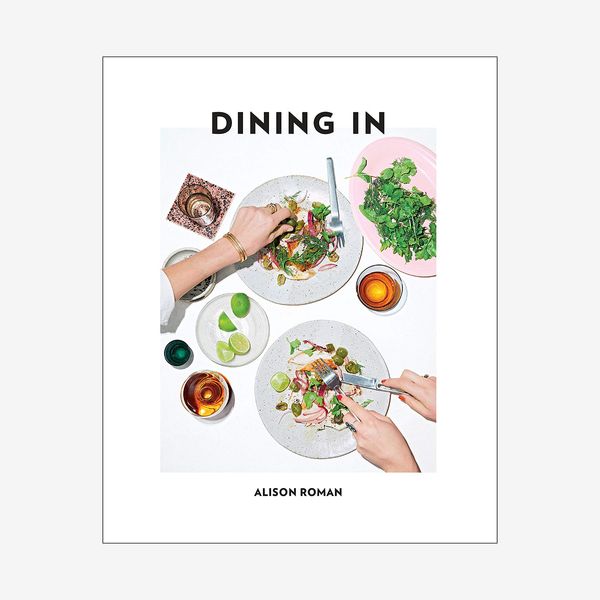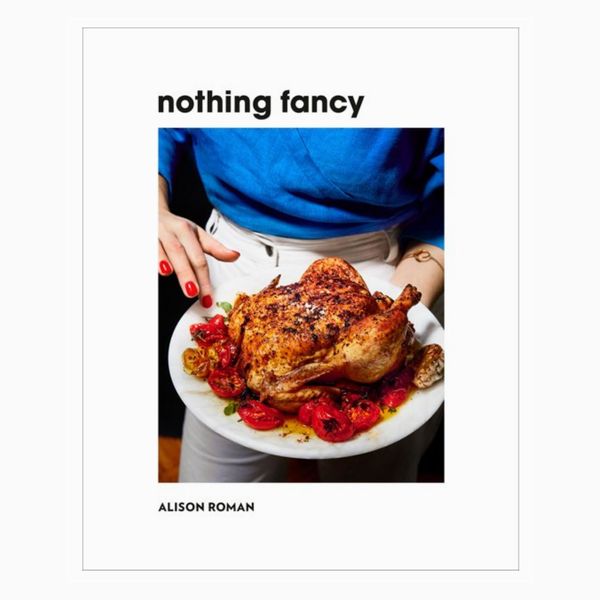
This article was featured in One Great Story, New York’s reading recommendation newsletter. Sign up here to get it nightly.
Alison Roman arrived before we needed her — which is a minor piece of luck, in the grand scheme of things, but not nothing. Dining In came out in October 2017, or two and a half years before dining in became a public-health requirement in America’s major metropolitan areas.
Roman’s second cookbook, Nothing Fancy, appeared last year and followed Dining In onto best-seller lists. Between book releases, she joined the New York Times as a food columnist; the email announcing her column bore the subject line “Alison Roman! Alison Roman!” As the country weathers a pandemic, as grocery shopping becomes careful provisioning, as Roman’s hearty stews and pantry-staple pastas fortify her countless fans, she has achieved a new level of culinary success: She has become the domestic goddess of the apocalypse.
Roman was a star before, of course. But she was the kind of star who inspired enthusiasm tempered at times by a certain mild ambivalence — a slight defensiveness, a little self-deprecating shrug. Part of this was just reluctance about jumping on a bandwagon. To peruse the Alison Roman oeuvre is to feel abject in your dumb, recognizable desires: for casual abundance amid beer cans, beach blankets, and burned candles; for indulgent meals in some fantasy Brooklyn-L.A. It is sometimes somewhat unpleasant to sense that somebody has your number so exactly. At the grocery store, in line with your preserved lemons, you knew you were a cliché. Still, assuming you were willing to suck it up and admit you were just like everyone else you knew, the reward was some very tasty pasta (or artichokes, or lamb stew).
And then, too, there’s the tone of the books and the columns: Not unlike anchovies, it is perhaps an acquired taste. Dining In is the kind of cookbook where a recipe for salted butter and chocolate-chunk cookies begins, “I’ve always found chocolate chip cookies to be deeply flawed.” In order to remedy chocolate-chip cookies’ flaws, Roman devised a recipe that became known online as “The Cookies,” a turn toward definite articles she embraced — and has continued to embrace, with successors like “The Stew” and “The Dip.” Roman approaches food with an invigorating bossiness, a fight-me bravado that can barrel past you if it doesn’t pull you onboard. Or maybe it pulls you onboard only to leave you wondering where you’re headed.
“It’s possible that I don’t agree with the fundamental premise of The Cookie,” a friend admitted a while back, “which is that chocolate chip cookies ‘aren’t very good.’” Nonetheless, she’d made the cookies. So had I. Even as (I realized, in having this conversation) I also disagreed with that premise. In fact, when I thought about it, The Cookie eliminated the precise things that I liked most in a chocolate-chip cookie (chewiness, thinness, meltiness). I had made The Cookies at least four times. Why?
My working theory was this: Roman’s recipes are a record of hungers correctly identified and sated; she conveys the authority of knowing exactly what she wants, and she is credible in part thanks to the extreme clarity of all she does not like. “(I have a very inflexible ‘no bell pepper’ policy),” reads one representative aside. Similarly, “I’ll come right out and say that I’m not really into bechamel.” Also: “I honestly cannot understand the phenomenon that is Avocado Toast.” Irritation with inferior alternatives seems to motivate much of her baking, e.g., “Whenever I have a muffin, my first thought is generally, ‘Why aren’t muffins better?’” Recommending Kettle Chips and Cape Cod Chips in Nothing Fancy, she writes, “The potato chip is an extremely personal thing, and I would never force my very high standards and strict opinions on you (just kidding — yes, I would!)”
My original theory still holds, but it’s evolved in light of recent events. Now I think that even people who didn’t want high standards and strict opinions forced on them two months ago have probably changed their minds.
In these uncertain times: So begin the emails from coffee shops, corporations, clothing brands, and yoga studios last visited under the Obama administration. No one knows what the coming weeks and months will be like to live through. The craving for certainty is universal and acute, and — at least within the (for now) manageable realm of food preparation — Alison Roman has certainty to spare. Maybe having something called “The Stew” foisted upon your Instagram feed last year was a little annoying, but that definite article doesn’t sound so bad now. Lacking anything like “The Plan,” we would like to know what we are supposed to be doing. We would like someone who seems like they know what they’re doing to tell us what to do and how.
This is an impulse that can get a little troubling when you venture much beyond the kitchen. “Andrew Cuomo Is the Control Freak We Need Right Now,” read the headline on Ben Smith’s Times column last week, praising the governor’s aggressive crisis leadership. Smith quotes a “political insider” who tells him that Cuomo’s “‘my way’ approach can be maddening on a lazy Sunday, but ideal when the world is cooking on a Friday night.” Embracing the crisis leadership of Alison Roman comes with none of the baggage of Andrew Cuomo’s actual politics — and the world is certainly cooking now.
For those of us currently lucky enough to lead lives of Zoom meetings and sweatpants, cooking isn’t just the alternative to going out; cooking is a way to feel useful. Because I’m not a doctor or nurse — because I don’t have a magic supply of N95 masks to give the people who are — I feel largely useless right now. I feel like a wave is cresting above the world as I know it, and I don’t know what to grab or where to run. At least a recipe offers the solace of a plan. Follow the steps, measure carefully, and even the worst failures are minor and contained.
Recall the post-9/11 Onion headline “Not Knowing What Else to Do, Woman Bakes American-Flag Cake”: “Having already donated blood, mailed a check to the Red Cross, and sent a letter of thanks to the New York Fire Department, Pearson was aimlessly wandering from room to room in her apartment when the idea of creating the confectionery stars and stripes came to her.” Donate to a food bank, donate to a worker relief fund, find a Google Doc of local mutual aid projects, and then find yourself staring into your own refrigerator. What next? One observer on Twitter shared the Onion story with a note: “This is every millennial but with @alisoneroman recipes.”
Roman retweeted it. She’s been online answering questions, telling readers how to cook her recipes, sharing a shopping list of ingredients required to cook the Alison Roman way. She did not ask to be the food authority of the moment at the exact moment when a once-in-a-century global cataclysm struck, but she has risen to the challenge. She is a one-woman task force to keep the well-heeled semi-youth at home and healthy until such time as they can emerge and be of use.
The best thing I’ve gotten from Alison Roman are preserved lemons. I’d never had them before making the lamb stew from Dining In, but I love them now and cook with them all the time. Back in the days before the Williamsburg Whole Foods line wound around the block, I bought some extra lemons: Maybe I’ll start preserving my own, I thought. This weekend, I finally did, following Alison Roman’s recipe. I sliced the lemons almost in half, careful not to cut all the way through, then I stuffed them with kosher salt and sealed them up in a small lidded pot to soften and pickle; in four weeks, they’ll be ready.
Four weeks: I can imagine a future in which I retrieve them from their cool, dark place and am glad to have preserved lemons. I can also imagine a future in which I find them and am mystified to remember that in late March, making preserved lemons felt like a worthwhile thing to do.
When I made a double batch of Alison Roman’s broccoli rabe stew in January and froze the leftovers, I thought they’d be a quick weeknight meal, not emergency supplies. But I do feel a little better than I otherwise would, having them in the freezer now. I hope that this is true of the lemons, too — though both are reminders that the reassuring certainty of cooking lasts only to the recipe’s end. It’s very possible that events will cause me to forget the lemons entirely.






